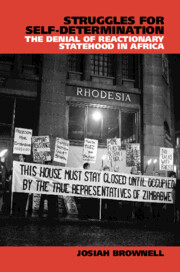
-
Select format
-
- Publisher:
- Cambridge University Press
- Publication date:
- November 2021
- December 2021
- ISBN:
- 9781108966825
- 9781108832649
- 9781108959971
- Dimensions:
- (229 x 152 mm)
- Weight & Pages:
- 0.64kg, 328 Pages
- Dimensions:
- (229 x 152 mm)
- Weight & Pages:
- 0.5kg, 328 Pages
You may already have access via personal or institutional login
Book description
Katanga, Rhodesia, Transkei and Bophuthatswana: four African countries that, though existing in a literal sense, were, in each case, considered by the international community to be a component part of a larger sovereign state through which all official communications and interactions were still conducted. This book is concerned with the intertwined histories of these four right-wing secessionist states in Southern Africa as they fought for but ultimately failed to win sovereign recognition. Along the way, Katanga, Rhodesia, Transkei, and Bophuthatswana each invented new national symbols and traditions, created all the trappings of independent statehood, and each proclaimed that their movements were legitimate expressions of national self-determination. Josiah Brownell provides a unique comparison between these states, viewed together as a common reaction to decolonization and the triumph of anticolonial African nationalism. Describing the ideological stakes of their struggles for sovereignty, Brownell explores the international political controversies that their drives for independence initiated inside and outside Africa. By combining their stories, this book draws out the relationships between the emergence of these four pseudo-states and the fragility of the entire postcolonial African state structure.
Reviews
‘Josiah Brownell traces the making of four unrecognised state regimes - Katanga, Rhodesia, Transkei and Bophuthatswana - from their African locales to the United Nations and Wall Street, showing how high finance, diplomatic recognition, tourism and postage stamps were just some of the elements used to assert and make their statehood visible at a time of profound political change. This important study, in taking seriously both the performative and substantive expressions of reactionary statehood, brilliantly writes their separate and linked histories into the wider story of African decolonization.’
Miles Larmer - University of Oxford
Contents
Metrics
Altmetric attention score
Full text views
Full text views help Loading metrics...
Loading metrics...
* Views captured on Cambridge Core between #date#. This data will be updated every 24 hours.
Usage data cannot currently be displayed.
Accessibility standard: Unknown
Why this information is here
This section outlines the accessibility features of this content - including support for screen readers, full keyboard navigation and high-contrast display options. This may not be relevant for you.
Accessibility Information
Accessibility compliance for the PDF of this book is currently unknown and may be updated in the future.


